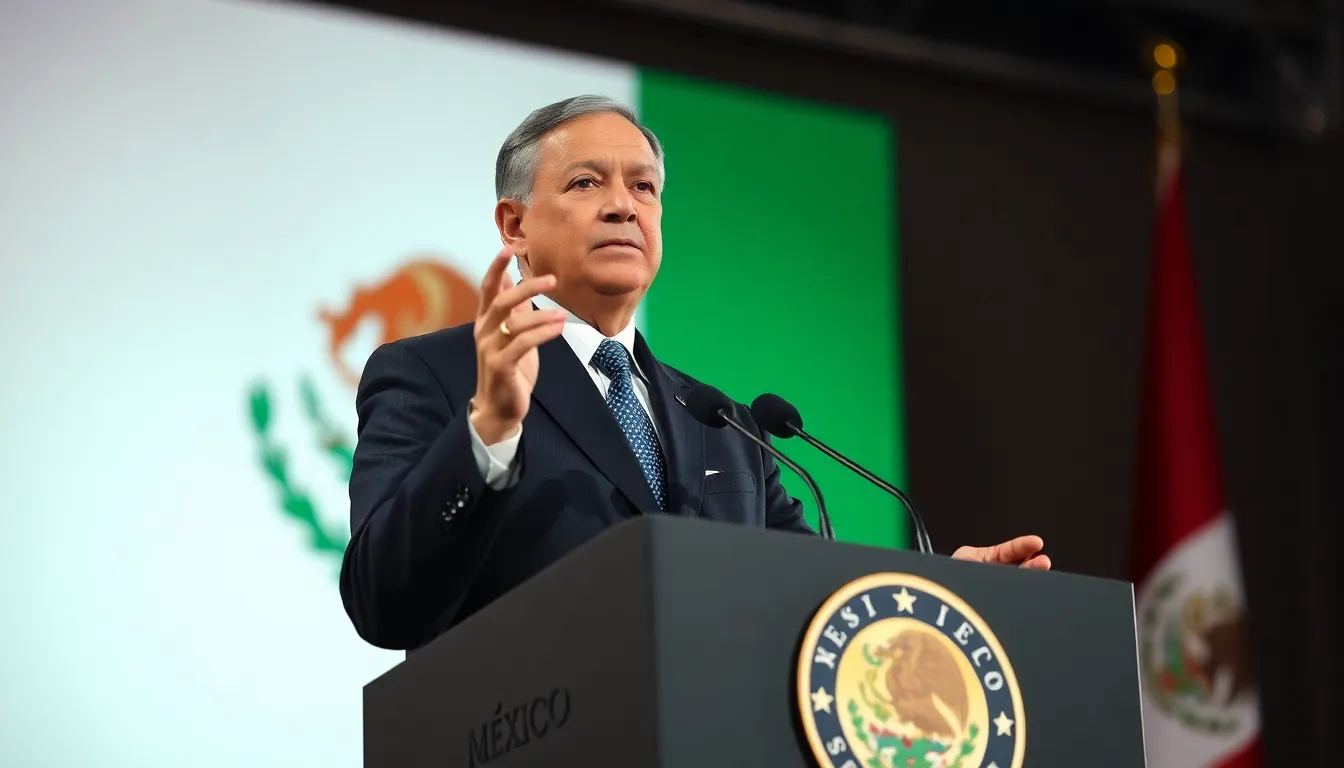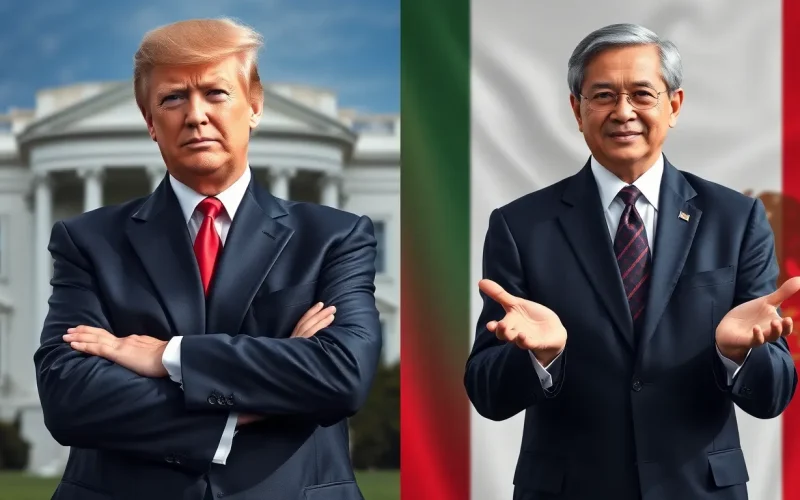Table of Contents
ToggleWhen it comes to political drama, few rival the antics of Donald Trump and Mexico’s president. Imagine a soap opera where the plot twists involve trade deals, border walls, and social media smackdowns. The stakes are high and the banter is often hilarious, making it hard to look away.
Overview of Mexico’s Political Landscape
Mexico’s political landscape features a complex interplay of various parties and ideologies. The current administration, led by President Andrés Manuel López Obrador (AMLO), emphasizes nationalism and social welfare. His party, the National Regeneration Movement (MORENA), has gained significant traction since its inception in 2014, focusing on anti-corruption and economic reforms.
Opposition parties, including the National Action Party (PAN) and the Institutional Revolutionary Party (PRI), play crucial roles in the political arena. Both parties have historically influenced governance in Mexico but face challenges in maintaining their relevance amid changing public sentiments. Engaging in alliances and coalitions, they strive to combat AMLO’s dominance and regain voter trust.
In response to external pressures, particularly from the United States, Mexico’s government has adopted a pragmatic approach. Recent trade agreements, such as the United States-Mexico-Canada Agreement (USMCA), showcase an effort to balance economic interests while asserting national sovereignty. Concessions made in trade discussions often elicit mixed reactions from the public and political factions.
Public opinion holds
significant sway in shaping policies. Surveys indicate that AMLO’s handling of relations with the Trump administration polarizes Mexican citizens. Some appreciate his assertive stance, while others criticize perceived submission in negotiations involving immigration and trade.
Overall, the political dynamics in Mexico remain fluid. Key issues include economic stability, social justice, and foreign relations. This environment fosters an ongoing dialogue that influences both domestic policy and international interactions, particularly with the United States.
Initial Reactions to Trump’s Presidency

President Andrés Manuel López Obrador (AMLO) swiftly addressed Donald Trump’s election. His initial focus involved promoting dialogue over division. AMLO emphasized cooperation between Mexico and the U.S., reflecting a desire for stability in bilateral relations.
Statements from the Mexico President
López Obrador made clear his intentions to foster respect in discussions with the Trump administration. He characterized trade relations as essential for mutual benefit. Comments about building walls concerning immigration highlighted his firm stance against exclusionary policies. AMLO insisted on focusing on economic growth and investing in job creation. His approach prioritized respectful negotiation over confrontation.
Public Sentiment in Mexico
Public opinion in Mexico displayed mixed reactions to Trump’s presidency. Some citizens expressed concern about potential trade disruptions. Others feared the impact of Trump’s immigration policies on Mexican communities. Increased nationalism surfaced in response to perceived insults from the U.S. While many expected conflict, some hoped for pragmatic engagement. Overall, a significant portion of the populace supported AMLO’s strategy of dialogue and cooperation.
Key Issues in the Mexico-Trump Relationship
The dynamics between Mexico and Trump have centered on several key issues. These issues have significantly influenced the bilateral relationship.
Trade Agreements and Tariffs
Trade agreements shaped the economic landscape between the two nations. The United States-Mexico-Canada Agreement (USMCA) replaced NAFTA, aiming to strengthen trade ties. Mexico’s economy relies heavily on exports to the U.S., making this agreement crucial. Additionally, tariffs imposed on Mexican goods by the Trump administration created tension. Businesses expressed concerns about potential price increases and market instability. Despite these challenges, López Obrador emphasized cooperation to mitigate adverse effects. Negotiations often reflected Mexico’s desire to maintain access to the U.S. market while addressing Trump’s demands.
Immigration Policies and Border Security
Immigration policies generated substantial debate in the Mexico-Trump dialogue. López Obrador opposed Trump’s harsh immigration stance, advocating for respectful discussions. Increased border security measures raised concerns regarding human rights and migrant treatment. Many Mexicans viewed Trump’s proposed border wall as a symbol of exclusion. AMLO’s administration focused on improving economic conditions in Central America to address root causes of migration. Public sentiment in Mexico reacted strongly against anti-immigrant rhetoric. Cooperation and mutual respect served as cornerstones of Mexico’s strategy to navigate these contentious issues.
Significant Events and Meetings
The interactions between Mexico’s president and Donald Trump comprise a series of significant meetings and responses that shaped their relationship. AMLO’s diplomatic efforts aimed at fostering positive dialogue proved crucial during this period.
The Summit between Trump and the Mexico President
The summit in 2018 stood as a pivotal event in the Mexico-U.S. relationship. At this meeting, both leaders engaged in discussions centered on trade, immigration, and security. AMLO emphasized the importance of mutual respect throughout the dialogue. Trump reciprocated with a commitment to creating equitable trade conditions. Agreements reached during this summit paved the way for improved collaboration, despite underlying tensions. Ultimately, both presidents left the meeting with a shared commitment to navigate challenges together.
Responses to Policy Changes
Mexico’s government reacted swiftly to various policy changes initiated by Trump’s administration. Trade tariffs sparked significant concern among Mexican officials, prompting AMLO to advocate firmly against them. Efforts to renegotiate trade terms directly followed these tariffs, highlighting Mexico’s desire for favorable conditions. Additionally, shifts in immigration policy resulted in AMLO urging constructive engagement rather than confrontation. This approach aimed to bolster economic stability in Central America, addressing the root causes of migration. Thus, Mexico’s responses reflected a commitment to diplomacy and cooperation in light of ongoing challenges.
Media Coverage and Public Perception
Media coverage has played a significant role in shaping public perception regarding the interactions between Mexico’s president and former U.S. President Trump.
Mexican Media’s Perspective
Mexican media outlets have closely monitored the evolving relationship, often depicting AMLO’s diplomatic approach as a strategy for stability. News reports frequently highlight his calls for cooperation, especially regarding trade and immigration. Commentators emphasize public support for AMLO’s efforts to maintain a respectful dialogue with Trump. This perspective contrasts with the rising nationalism among the populace due to perceived slights from the U.S. border wall rhetoric. Analysis of social media reactions indicates mixed feelings, as many Mexicans feel both pride in their country and concern over external pressures.
International Media Analysis
Internationally, coverage tends to focus on the challenges surrounding AMLO’s administration in the context of Trump’s policies. Reports analyze the complexities of trade agreements such as the USMCA, stressing their implications for both nations. Journalists often discuss how AMLO’s softer, diplomatic stance aims to mitigate tensions in bilateral relations. Coverage highlights the potential consequences of Trump’s immigration policies, which often draw criticism from international observers. Public opinion pieces suggest that AMLO’s strategy of pragmatic engagement seeks not only to safeguard Mexican interests but also to foster regional collaboration.
The relationship between Mexico’s president and Donald Trump has proven to be a complex interplay of diplomacy and national pride. López Obrador’s commitment to dialogue and cooperation stands in stark contrast to Trump’s often confrontational approach. This dynamic has shaped trade agreements and immigration policies that impact both nations.
As Mexico navigates these challenges, public sentiment remains a powerful force. The blend of nationalism and support for AMLO’s pragmatic strategies reflects the country’s desire for respect and stability. Ultimately, the evolving political landscape will continue to influence Mexico’s response to external pressures, emphasizing the importance of constructive engagement in a rapidly changing world.





